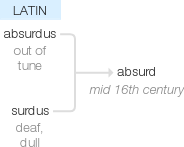Absurd
mid 16th century: from Latin absurdus ‘out of tune’, hence ‘irrational’; related to surdus ‘deaf, dull’.
wiktionary
First attested in 1557. From Middle French absurde, from Latin absurdus(“ incongruous, dissonant, out of tune”), [1] from ab(“away from, out”) + surdus(“silent, deaf, dull-sounding”). [2] Compare surd.
etymonline
absurd (adj.)
"plainly illogical," 1550s, from French absurde (16c.), from Latin absurdus "out of tune, discordant;" figuratively "incongruous, foolish, silly, senseless," from ab- "off, away from," here perhaps an intensive prefix, + surdus "dull, deaf, mute," which is possibly from an imitative PIE root meaning "to buzz, whisper" (see susurration). Thus the basic sense is perhaps "out of tune," but de Vaan writes, "Since 'deaf' often has two semantic sides, viz. 'who cannot hear' and 'who is not heard,' ab-surdus can be explained as 'which is unheard of' ..." The modern English sense is the Latin figurative one, perhaps "out of harmony with reason or propriety." Related: Absurdly; absurdness.
